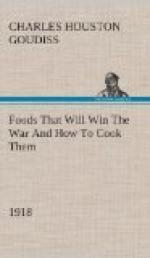1 cup milk
1 tablespoon corn syrup
1 egg beaten
Then brown in frying pan in small amount of fat. Spread with marmalade, jelly, cocoanut, or preserves and serve as dessert.
DRIED FRUIT PUDDING
One cup dried apricots, peaches or prunes
soaked two hours in two
cups
of water.
1 cup bread crumbs
2/3 cup corn syrup
1 teaspoon orange or lemon rind
2 eggs
1/8 teaspoon salt
1 teaspoon lemon juice
1/2 cup chopped nuts
Mix ingredients. Place in greased baking dish and bake 30 minutes in moderately hot oven.
CHEESE SAUCE ON BREAD
1/4 cup fat 1 pint milk 2 qts. milk 1/4 cup flour 1/4 teaspoon cayenne 1 cup cheese
Make as white sauce and add cheese. Pour over bread, sliced and toasted. Bake in moderate oven.
SURPRISE CEREAL
3 cups dried breadcrumbs
3 tablespoons maple syrup
1/2 teaspoon salt
Mix thoroughly and place in moderately hot oven for 20 minutes, stirring frequently. Remove and serve as breakfast food. Very inexpensive and delicious. Graham, corn or oatmeal bread is best for this purpose, but any bread may be used.
SURPRISE CROQUETTES
1 cup leftover cereal 1 cup chopped peanuts 1/2 cup dried breadcrumbs 1 beaten egg
Shape as croquettes and bake in oven or pan-broil. Serve with tart jelly.
CHEESE STRAWS
1 cup stale bread 1/8 teaspoon cayenne 1/2 cup grated cheese 1/4 cup milk 2/3 cup flour 1/4 teaspoon salt
Make into dough; roll 1/4 inch thick. Cut into strips 6 inches long and 1/2 inch wide. Place on baking sheet. Bake 20 minutes in moderate oven. Serve with soup, salad, or pastry.
SOUPS UTILIZE LEFTOVERS
In nearly every case when meat is purchased, some bone is paid for. Too frequently this is either left at the market or thrown away in the home. Bones, gristle, tough ends, head and feet of chickens, head, fins and bones of fish, etc., should be utilized for making soup.
If a meat or fish chowder with plenty of vegetable accompaniment is served, no other meat is required for the usual home meal.
If a cream of dried or fresh vegetables, or a meat stock soup with plenty of vegetables or cereal content, is served, the amount of meat eaten with the main course of the meal will be materially lessened.
Soups may be a most economical method of using water in which meat, fish or vegetables have been cooked; also of utilizing small portions of leftover meats, fish, vegetables or cereal.




